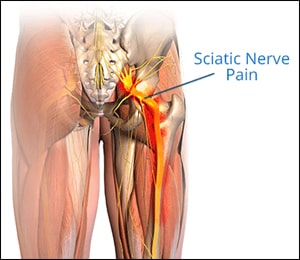AYURVEDIC TREATMENT OF SCIATICA
INTRODUCTION
Many of us suffer from aches, pains and stiffness at some stages of our lifetime. Our unhealthy lifestyle and unhealthy eating habits are responsible for various joint disorders and other problems associated with our bones and muscles.

ABOUT SCIATIC NERVE
The largest and longest nerve found in human body is Sciatic nerve. It starts in lower back and further it is found in whole lower limb till foot. These are two in number and formed by reunion of L4 L5 S1 S2 and S3 spinal nerves.
WHAT IS SCIATICA?
Sciatica is not a disease or any condition, it is bunch of symptoms which include pricking pain, numbness, tingling sensation weakness that starts from lower back and radiated to buttocks and lower limbs till foot. Main cause of pain in Sciatica is rather compression or irritation of Sciatic nerve.
AYURVEDIC OPINION
"GRIDHRASI" is ayurvedic term used for Sciatica and this is a painful condition of lower limbs. Word Gridhrasi is derived from Sanskrit word "GRIDHA" which means vulture. Due to severe pain in legs they become stiff and slightly curved and patient walks like vulture. It is a vatavyadhi and intake of vata rich foods cause aggravation of vatadosha which is main cause of Sciatica. Initial symptoms of this disease are pain, stiffness, sensation of pricking needles, pulsation and gripping sensation in gluteal region and further this pain is relocated in Kati region (Pelvic region), Jaanu (below knees), Jangha (thighs) and Pada (foot). This painful sensation in lower limbs is due to vitiation of vatadosha.
Ayurveda also considers Vataj-Kaphaj Gridhrasi in which vata is main dosha and kapha is sub dosha.
CAUSES OF SCIATICA
Symptoms of other diseases becomes major factors to cause this disease and are mentioned below:-
- Disc prolapse
- Spinal stenosis
- Pregnancy
- Tumors
- Osteoarthritis and osteoporosis
- Rheumatoid arthritis
- Infections of pelvis
- Pelvic fractures
- Dysfunction of sacro-iliac joint
SYMPTOMS OF SCIATICA
- Pain is the major symptom of this disease and it may vary from mild to severe. Pain is radiating and it worsen on sitting, standing and even in lying position.
- Numbness
- Tingling and pricking needle like sensation
- Muscular weakness
- Difficulty in leg and foot movements
DIAGNOSIS OF SCIATICA
- Physical examination
- Blood examination
- ESR count
- X-ray, CT scan and MRI
- Abdomino - pelvic ultrasonography
- Urine examination
TIPS TO GET RELIEF FROM SCIATIC PAIN
- Use heat and ice packs to reduce Sciatic pain.
- General massage and exercise gives relief from pain.
- Stretching can offer good support to back and reduces pain.
- Try to avoid long sitting for several hours.

